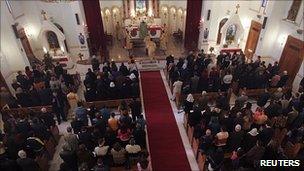Iraqi Christians' long history
- Published

Large number have fled but thriving congregations remain in places
Christians have inhabited what is modern day Iraq for about 2,000 years, tracing their ancestry to ancient Mesopotamia and surrounding lands.
Theirs is a long and complex history.
Before the Gulf War in 1991, they numbered about one million. By the time of the US-led invasion in 2003 that figure fell to about 800,000.
Since then the numbers are thought to have fallen dramatically.
Under Saddam Hussein, in overwhelmingly Muslim Iraq, some Christians rose to the top, notably Deputy Prime Minister Tariq Aziz, and the Baathist regime kept a lid on anti-Christian violence.
But this started to change after the removal of Saddam Hussein and the US-led occupation of Iraq.
Attacks
A spate of attacks on Christian targets in Mosul, Baghdad and elsewhere in 2004 and 2005 accompanied a more general breakdown in security in Iraq. It is thought that proportionally more Christians - who were sometimes accused by extremists of collaborating with the "crusading" US forces - left.
Clerics and members of their congregations who have stayed have continued to face the threat of kidnapping by some extremist Muslim groups as well as targeted attacks.
In March 2010, hundreds of Iraqi Christians demonstrated in a town near Mosul and in Baghdad, calling for government action after a spate of killings.
The killings of eight Christians also prompted an appeal by Pope Benedict for Iraqi authorities to protect vulnerable religious minorities.
Two years earlier, the Chaldean Catholic Archbishop of Mosul, Paulos Faraj Rahho, was kidnapped and murdered.
Biblical city
In the wake of the 1991 Gulf War and the imposition of sanctions, many Iraqi Christians, who had lived in relative harmony with their Muslim neighbours for decades, left to join family in the West.
The secular government of Saddam Hussein did not persecute Christians in the way it did the Kurds and some Shia areas, but it did subject some Christian communities to its "relocation programmes".
For Christians, this was particularly marked in the oil-rich areas, where the authorities tried to create Sunni Arab majorities near the strategic oilfields.
Christians live in the capital, Baghdad, and are also concentrated in the northern cities of Kirkuk, Irbil and Mosul - once a major Mesopotamian trading hub known as Nineveh in the Bible.
Most Iraqi Christians are Chaldeans, Eastern-rite Catholics who are autonomous from Rome but who recognise the Pope's authority.
Chaldeans are an ancient people, some of whom still speak Aramaic, the language of Jesus.
Monasteries
The other significant community are Assyrians, the descendants of the ancient empires of Assyria and Babylonia.
After their empires collapsed in the 6th and 7th Centuries BC, the Assyrians scattered across the Middle East.
They embraced Christianity in the 1st Century AD, with their Ancient Church of the East believed to be the oldest in Iraq.
Assyrians also belong to the Syrian Orthodox Church, the Chaldean Church, and various Protestant denominations.
When Iraq became independent in 1932, the Iraqi military carried out large-scale massacres of Assyrians in retaliation for their collaboration with Britain, the former colonial power.
Villages were destroyed, and churches and monasteries torn down.
In recent years, however, some places of worship were rebuilt.
Other ancient Churches include Syrian Catholics, Armenian Orthodox and Armenian Catholic Christians, who fled from massacres in Turkey in the early 20th Century.
There are also small Greek Orthodox and Greek Catholic communities, as well as Anglicans and Evangelicals.